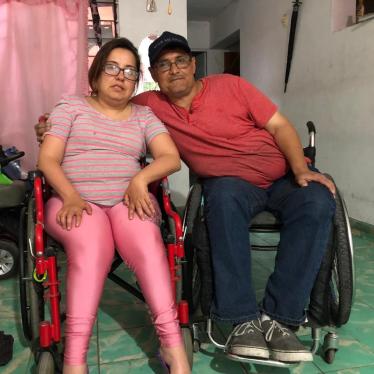Felipe Orozco, 45, is a Puebla resident who was diagnosed in 2003 with schizophrenia. This condition makes him have visual and auditory hallucinations, mostly when he is under severe stress. In early 2013 he had a mental health crisis that prompted his family to seek mental health services.
Orozco was subsequently hospitalized. He cannot remember how he got to the psychiatric hospital. When he woke up, he found himself tightly restrained by bandages around his arms and legs. When he asked to use the bathroom, staff told him that he would have to urinate in the bed, and that they would clean his bed later. Staff ignored his repeated requests for help.
Since then, Orozco has been hospitalized five times. On one occasion in 2018, staff at a psychiatric hospital in Puebla shackled him naked with a padlock at night for two-and-a-half weeks, and he was forced to defecate and urinate in his bed. He was not allowed to see anyone, although his father tried to visit him.
Involuntary placement and treatment in psychiatric facilities occurs across Mexico. According to Dr. Osiris Pazarán Galicia, director of Fray Bernardino Álvarez’s psychiatric hospital in Mexico City, one of the country’s largest, the hospital registers 3,200 hospitalizations a year, 2,600 of them involuntary.
Involuntary hospitalizations are most often initiated by family members who decide, with the agreement of a health professional, that the person needs hospital treatment. The rationale behind this practice, Dr. Pazarán said in a public event, is that the patient, and often maybe family members, are at risk. However, it ignores the scientific studies that show forced psychiatric treatment is a source of trauma and can lead to further deterioration of mental health.
Involuntary placement in a hospital and forced treatment of a person on the basis of their disability, and the use of physical restraints like those used on Orozco, are prohibited under the Convention on the Rights of Persons with Disabilities, which Mexico ratified in 2007 and which has constitutional status. Yet these practices are sanctioned by the general Health Act in Mexico.
The act is now under review by Congress, providing the perfect opportunity for urgently needed reform to better protect the rights of people with disabilities. Instead on November 18, the House of Representatives’ Health Commission passed a bill that expands the use of involuntary hospitalization and treatment for people who have “problematic use of drugs,” or “addictions.”
The bill is scheduled to go to the plenary for debate and potential approval soon. Legislators can improve the bill in line with Mexico’s human rights obligations. For guidance, for example, legislators can draw on the World Health Organization’s Quality Rights Initiative, which provides clear and practical guidance on how to create a rights-respecting approach to mental health.
One of the initiative’s core principles is that people should be able to maintain control over their lives, with others respecting their will and preferences regarding support, rather than forcing them to be in a hospital or take medication against their will.
There are also initiatives in several countries that aim to support people with psychosocial disabilities, such as the Tandem Plus program in Brussels, and the Open Dialogue initiative, which both provide in-home support to people experiencing acute mental health distress. The goal of these initiatives is to ensure that the voice and choices of the person concerned are heard and taken seriously. Medication and other treatments can be helpful to people with psychosocial disabilities, if they are freely chosen, but they aren’t the only option.
Rather than reinforcing the use of coercive measures against people with psychosocial disabilities and expanding their use against others, such as people who use drugs, Congress should choose a rights-respecting approach for mental health reform that respects people’s equality and human rights as well as their real needs for empathy, recognition, and support services that they control.







